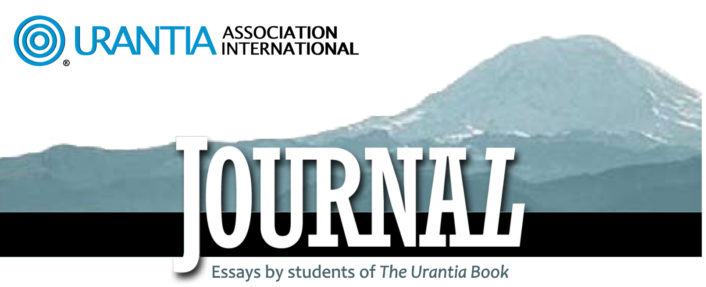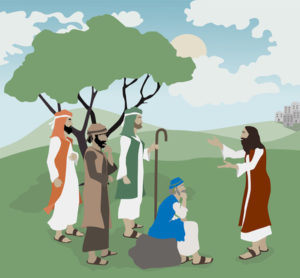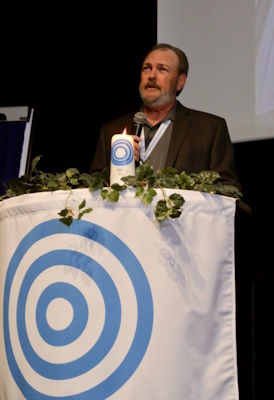© 2018 Suzanne Kelly, David Elders, David Linthicum, Rick Lyon
© 2018 International Urantia Association (IUA)

(Note: To print a hard copy of this Journal click the “Print Version” button above. After the print version appears, right-click into any white space and choose “Print.”)
¶ In This Issue
- Editorial – Suzanne Kelly, USA
- The Purpose of the Fifth Epochal Revelation – Sunshine Coast Study Group, Queensland, Australia, 1990
- The Personal Experience of Revealed Truth – David Elders, USA
- The Eyedropper, Spoon, and Shovel – David Linthicum, USA
- Family Crises – Rick Lyon, USA
- About the Journal
¶ Editorial
Suzanne Kelly, USA

Greetings fellow Urantia Book readers,
In this November edition of Journal we have several essays that focus on the personal understandings gleaned from studying The Urantia Book. Our first essay, The Purpose of the Fifth Epochal Revelation, was written by members of the Sunshine Coast Study Group, Queensland Australia in 1990. A prominent member of that group back then was Ken Glasziou who is well-known in the Urantia community for his many scientific papers. The essay starts with a very important question, “Why has this new revelation come to us specifically at this time, and not one thousand years hence or whence?” Their answer helps to edify the reason, paraphrasing from Paper 99, “In the past, religion did not have to adjust its attitude to extensive changes in economic and political systems; today the rapidity of changes in living conditions is such that institutional modifications must be greatly accelerated, and religion must quicken its adaptation to an ever-changing social order. We are told that these periods of gross instability will endure for a thousand years; that the human race must become reconciled to a procession of changes, adjustments and readjustments and that mankind is on the march toward a new and unrevealed destiny.”
Another question presented was about how we accomplish the spreading of these truths. Should we be a disciple or an apostle? As a disciple we become a follower or student of a teacher: “One difference between discipleship and apostleship as announced by Jesus is that, in undertaking apostleship, we elect to represent him in the world in the same way that, in his human life on Urantia, he represented the Father. This is certainly a rigorous undertaking, for it is not by the words we speak but by the lives we live that we will represent Jesus to the world.” Our authors succinctly address this directive “to farsighted men and women of spiritual insight and with the necessary skills and abilities, using The Urantia Book as source material, to conduct those secondary works that will permit the teachings of the book to penetrate to all segments of all societies and thus…
…attract all that is good in the mind of man and challenge that which is best in the human soul. [UB 2:7.10]
Are you a disciple or an apostle?
¶ The Purpose of the Fifth Epochal Revelation
Sunshine Coast Study Group, Queensland, Australia, 1990

Is it the Recruitment of Genuine Apostles?
What is the specific purpose of the fifth epochal revelation on this planet? While this may seem obvious to very many readers of The Urantia Book, to others who are familiar with the finest concepts and teachings of Christianity as well as the best in several other of the world’s religions and philosophies, the answer is not so obvious. Excepting for detailed information on the hierarchical structure among the heavenly hosts that we have no means of verifying, much of the book’s content has been stated elsewhere. Neither do the scientific aspects of the book bring much new knowledge independently within a short time after the book’s publication.
Perhaps the simplest conclusion is that it has been given to us in order that we should recognize our sonship with the Father and the brotherhood of all men. But that message is not new, so is there some other purpose for this revelation? Undoubtedly part of its purpose is to rectify error that has partially negated the effectiveness of the fourth epochal revelation. Another purpose would be to amplify upon our knowledge of our place in the totality of God’s creation. But why has this new revelation come to us specifically at this time, and not one thousand years hence or whence?
¶ The Personal Experience of Revealed Truth
David Elders, USA

Our Urantia Book Internet School Pedagogy
This essay is offered as a context exploration of our Urantia Book Internet School (UBIS) pedagogy and methodology in response to a provocative question: can our encounter with newly-revealed, epochal truth be facilitated successfully by employing evolutionary techniques of education or can revealed truth be comprehended using the interpretive teachings of the evolutionary religions of authority?
I would observe that it is the combined nature of revelation and the revelatory process which together determine how revealed truth is encountered, accessed, experienced, perceived, and learned to facilitate its integration into the soul of each truth seeker. I do not believe that this is possible using intellect alone, but only by accessing truth in our progressing morontial (soul) consciousness. Some two thousand years ago, Jesus sought acceptance and certification of his revelation by the existing, established, evolutionary religious authorities—the Scribes and Pharisees. But as revealed truth designed to uplift and supplant existing evolutionary beliefs, it was rejected at the time by these leaders. Nonetheless, it was eventually spiritually integrated into human consciousness via the living power of Jesus’ life, the Spirit of Truth, the consequential, universal bestowal of Adjusters, and at the present time by the gift of the fifth epochal revelation to our world. Indeed, Jesus’ crucifixion represented the conscious evolutionary response by religious authority to destroy the newly-revealed truths which were seen as a challenge to existing beliefs and theologies. Is that response a warning for us today?
¶ The Eyedropper, Spoon, and Shovel
David Linthicum, USA

(Editor’s note: This article was first published in the 2018 November Journal. It was adapted from a plenary speech delivered at the 2018 Netherlands conference. We are re-posting it in memory of the late David Linthicum who passed away on June 1, 2022.)
The conference theme of the 10th Urantia Association International conference in The Netherlands was “Jesus as a Teacher.” When I was asked to be one of the plenary speakers I thought it would be a great opportunity, even though I had never given a conference speech.
At the 2016 conference in San Antonio, TX, I presented my very first workshop, so I decided to expand on that workshop theme for my plenary speech in Holland, the workshop was titled, “The Eyedropper, Spoon, and Shovel.”
I came up with the idea primarily based on my experience with trying to get my family and friends to read The Urantia Book.
I found The Urantia Book and finished a cover-to-cover reading in 1996. Like many of us, I was eager to share this marvelous book with those closest to me, my family and friends. I couldn’t wait to tell my best friend the good news! I had discovered a true treasure, something beyond my wildest imagination.
One day I bought him a book and handed it to him saying, “Man, you have GOT to read this!” I was fired up! I was hoping my best friend would be just as excited as I was. I wanted him to read it, so we could share our thoughts as we had when we read the Carlos Castaneda and J.R.R. Tolkien books in years past.
Let’s just say, things didn’t work out as I had hoped; my friend never read the book. My effort was a dismal failure. I found out sometime later that he showed it to his wife who thumbed through it and declared it to be the work of the devil. I was heartbroken and disappointed.
¶ Family Crises
Rick Lyon, USA
(Adapted from a presentation given at Midwest Conference 2018)

All of us have faced a family crisis at some point—actually multiple points—in our lives. Some we create; some we fall victim to; and some that just happen.
This article is going to look at family crisis. The goal here is to help you look at how crisis effects our families, the barriers to overcoming family crisis, how we have addressed previous crises, find better ways to solve crises in the future, and perhaps prevent crises in the first place.
Let us look at my own personal family crisis as an example. The major crisis in my family was the physical and mental problems of my second son. His name is Brad. He was born in November of 1978; the same year I discovered The Urantia Book. He passed away in September of 2010.
¶ About the Journal

The Journal is produced twice yearly and contains essays, articles and study aids by readers and for readers of The Urantia Book. Any interpretations, opinions, conclusions, or artistic representations, whether stated or implied, are those of the authors and do not necessarily represent the views and opinions of Urantia Association International, the National or Local Urantia Associations, or the editorial team of the Association’s Journal.
You can view the entire collection of issues in the archives. All issues before 2017 are downloadable PDF format.
The Journal is currently published in English, French and Spanish. (There are some older issues that were published in Finnish.) You can view the French and Spanish Journals by clicking on the language choices in the pull down menu at the top of the page.
- Subscriptions
- Journal Team
- Submission Policy
- Citation Guidelines